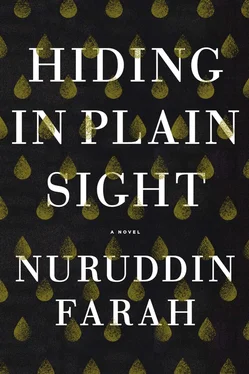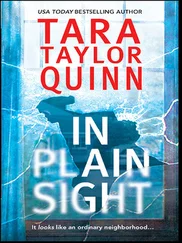Bella hesitates.
“Why don’t we start with you?” Gunilla says.
“How do you mean, start with me?”
“For starters, did you bring along all the forms of identification you need to fill in the insurance forms and collect his personal effects?”
Bella provides these. Gunilla scrutinizes the documents, and when their eyes meet, she smiles a little. Then she inspects the notarized copy of Aar’s will. Gunilla opens it page by page to study it, checking it closely with her eyes and then feeling the stamped bottom corner, as if examining for its authenticity. When Bella asks her if the version of Aar’s will that she has now submitted and that nominates her as his executor is the most recent and therefore the valid one, the Swede checks it against the copies of the documents that are on file.
Then Gunilla reads part of the will out loud, pointing especially to Aar and Valerie’s “out of community of property marriage in England.” She consults the will on file against the one Bella has brought along: same working, same provisions, same signatures, including Fatima’s and Mahdi’s. “Yes,” she says, “I met them even before I met Salif and Dahaba.”
Gunilla and Bella now hear a gentle knock on the door and Immaculata enters. A tray on which there are glasses of water and coffee precedes the tea girl into the room. When Immaculata has set the tray down on the low table, Gunilla says, “Thank you, that is all for now.”
When the young woman has left, Gunilla pours out two cups and asks if Bella takes milk or sugar. Bella shakes her head no and then, nodding and mouthing the word “Thanks,” receives the cup with both hands. She waits until Gunilla’s cup is poured before she takes a sip.
At last they get to the final form. “This one is difficult,” says Gunilla. “It gives you the right to receive his personal effects.”
Try as she might, Bella can exercise no more self-restraint. And Gunilla joins her in weeping. Eventually, she pulls herself together and says, “How about I put the questions to you and I write down what you say?”
It is easy for Bella to make room in her heart for Gunilla.
The questions are easy to answer: date of birth, place of birth, current nationality, profession, address, marital status, Bella’s relationship with the deceased, date and place of death, date and place of burial.
These last questions give Bella an occasion to ask some of her own, questions she has been dreading and yearning to ask. “What do you know about how he died?” she asks.
“According to one of the survivors brought to a Nairobi hospital for his serious wounds that proved to be fatal,” says Gunilla, “Aar is believed to have died immediately from a bullet that penetrated his heart. He was hit, execution style. And according to unconfirmed reports in the Mogadiscio press, he knew the man who struck him, the Shabaab mole working in the UN office with him who not only knew him but also had threatened him.”
“And his burial,” Bella asks, repeating the version she has read in the papers.
Gunilla replies, “The explosion soon after the Shabaab mole shot him fragmented not only his body but also the bodies of several other victims who could not even be identified.”
“Do we have any idea if the forensics folks know if his body suffered a second, more severe trauma following the latter explosion?” Bella says.
“We’re waiting for the FBI report.”
“How is it that the FBI is involved?”
“Because some Americans were among the dead,” explains Gunilla, “and in any case, there are no Somali forensics teams available — you know how things are in that country better than I do.”
All of a sudden, Gunilla catches Bella’s eyes and this time her burst of emotion becomes uncontainable. Bella is equally in a delicate state, and although she finds it hard to desist from joining Gunilla, she doesn’t, telling herself that she has done enough weeping. Gunilla says, “I miss him terribly.”
“We all do,” Bella says.
“How are Salif and Dahaba faring?” Gunilla asks.
“It’s been difficult, but they are strong and lovely.”
“I met them twice, the first time on a camping trip.”
Bella says, “Their mother has been visiting. We met two nights ago for dinner — she and Padmini, her partner, and I — and she is now with Salif and Dahaba.”
“Since Valerie and Aar married out of community of property, the law is clear, from what I gather,” says Gunilla. “I’ve consulted a UN colleague who is British. Therefore, you have no worries there, legally speaking. But if the children were to declare strong loyalties and if she filed her papers here in Kenya, then you have some untidiness to deal with. Even so, the deciding judge must take her situation — that of being an absent mother for years — into account. Any idea how likely it is for the children to declare loyalty to her?”
“I doubt it, from the little I know since getting here.”
“And then, of course, it depends on what your intentions are.”
“What do you mean, what my intentions are?”
“Are you willing to take on the responsibility of parenting them? You are Aar’s executor of his will, and as long as they are with you, there is nothing to worry about.”
Gunilla turns several pages one at a time and then she talks to herself in a low voice in self-reprimand. Eventually, she says, “Valerie has been in touch with me too.”
“Has she now?”
“Her expectations are unreasonable.”
However much Gunilla pretends to be following the UN rules and acting neutral, Bella is aware that love and the memory of her affection toward Aar will sway her mind. She will exploit the play in the rope. “Valerie rang me at Padmini’s insistence, she assured me, to see Aar’s last will.”
“What was your answer?”
“It is out of the question.”
Bella is determined not to prod.
Gunilla goes through moments of nervy dithering. “Then a man claiming to be her lawyer rang me just before you came, wishing to know if this office had a copy of Aar’s will on file and if his wife and the mother of his children could see it. I replied that I would get back to him about it after I had the chance to look into the matter further. Meanwhile, I consulted a Kenyan who is well informed about who is who in the legal fraternity and who happens to be a good friend of Aar’s. I gave him the name of the lawyer representing Valerie. Apparently, said lawyer is Ugandan, with his chambers in Kampala, not here.”
Bella says, “They are married out of community of property and the two of them have not lived together or shared a conjugal bed for a number of years. Does she have any legal legs to stand on?”
“Chances are she won’t file.”
“Why do you say that?”
Gunilla narrows the blue hardness of her eyes into slits because the sun is in them. “Aar was of the impression that Valerie doesn’t have the patience to pursue any matter, especially a legal matter, to its conclusion. According to him, she would never do anything of the sort.”
“There is always a first time.”
“Aar used to say to me that Valerie would start on a project with great enthusiasm but wouldn’t follow it to its end. Even having the children was such a project, embarked on with passion but abandoned in the end. This has been her downfall: the inability to stay the course; the refusal to pay up when a bill is presented to her unless Padmini steps in to help. Now tell me,” she says, “how have Salif and Dahaba responded to her presence?”
“They are hostile to both Valerie and Padmini.”
“And how does that sit with you?”
“I want no friction if I can have it my way.”
Gunilla again opens one of the files, which she studies for a couple of minutes. She nods in silence in the manner of someone who has finally gained an understanding of a complicated matter. She says, “Please sign these forms using your name as it appears on your birth certificate and your passport.”
Читать дальше












